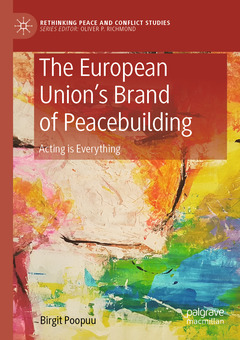Description
The European Union’s Brand of Peacebuilding, 1st ed. 2020
Acting is Everything
Rethinking Peace and Conflict Studies Series
Language: English
Subject for The European Union’s Brand of Peacebuilding:
Keywords
peace goods; identify; telling and acting; discourse and practice turns; dialogue; interpretive methodology; critical camp of peace and conflict studies; justice; just peace; Artemis; security as a peace good; EUFOR Althea; slice of peace; EULEK; rule of law as a peace good; European standards; European Union; EU; Peacebuilding; Common Security and Defence Policy
The European Union's Brand of Peacebuilding
Publication date: 08-2020
Support: Print on demand
Publication date: 08-2020
Support: Print on demand
The European Union's Brand of Peacebuilding
Publication date: 08-2019
Support: Print on demand
Publication date: 08-2019
Support: Print on demand
Description
/li>Contents
/li>Biography
/li>Comment
/li>
?Conceptually and empirically, this is the most thoughtful analysis of the role of EU?s peace missions I have read so far. It starts with the ?action for the sake of action? logic of CSDP development and offers a new interpretation of what CSDP could be, if just peace was part of its political agenda. A rare gem in European studies.?
? Xymena Kurowska, Associate Professor of International Relations at Central European University, Hungary
?This impressive research monograph provides a critical account of EUs peace missions by asking what these missions offer, how peace is built, and whom these missions serve. To address these important questions, Birgit Poopuu develops and employs an original and sophisticated discursive framework of telling and acting to conduct an in-depth investigation of EU peace missions Artemis in the DRC, EUFOR Althea in Bosnia-Herzegovina, and EULEX in Kosovo. This book?s ground-breaking exploration advances the study of the EU as a peacebuilder.?
? Annika Björkdahl, Professor of Political Science, Lund University, Sweden, and Editor in Chief of Cooperation and Conflict
1 Introduction.- 2 Identity in motion and in dialogue.- 3 A way to just peace?.- 4 Artemis in the Democratic Republic of the Congo: a necessary “success story”.- 5 EUFOR Althea in Bosnia: a tiny particle of the peacebuilding enterprise.- 6 EULEX in Kosovo: EULEKSPERIMENT.- 7 Conclusion
Birgit Poopuu is Research Fellow at the Department of International Politics, Aberystwyth University, Wales. She previously studied at the University of Tartu, has published on the EU’s peacebuilding and is currently working on the project The Politics of Peace and Conflict Knowledge: Syria and the Diverse Landscape of Local Knowledge/Experience.
Disrupts the predominant way of studying the EU’s Common Security and Defense Policy (CSDP) by problematising CSDP missions’ substance and purpose, rather than simply discussing the efficiency or effectiveness of the CSDP in its own terms Develops an analytical frame – using the fluid categories of telling and acting, stressing the dialogical ways of being, and taking heed of the concept of just peace as a particular guide to building peace – that is a particularly useful way to study peace actors Provides an incisive portrayal of one distinctive element – the CSDP missions – of the EU’s peacebuilding framework and as a result contributes towards a more rounded and complex understanding of the EU as a peacebuilder Suggests a number of policy-relevant conclusions, which may shift the dynamics of the EU’s becoming a peacebuilder towards more genuine actorness
© 2024 LAVOISIER S.A.S.




